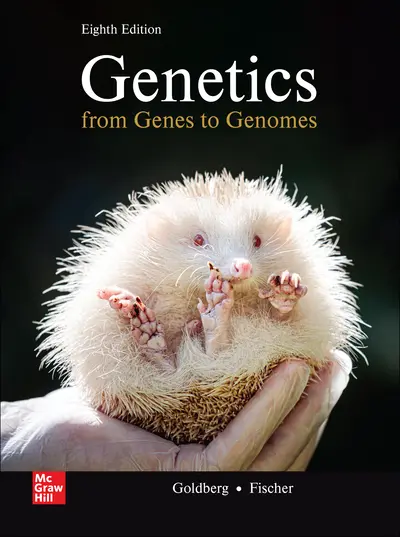My Account Details

ISBN10: 1265352267 | ISBN13: 9781265352264

* The estimated amount of time this product will be on the market is based on a number of factors, including faculty input to instructional design and the prior revision cycle and updates to academic research-which typically results in a revision cycle ranging from every two to four years for this product. Pricing subject to change at any time.
Instructor Information
Quick Actions (Only for Validated Instructor Accounts):
Genetics: From Genes to Genomes represents a new approach to an undergraduate course in genetics. It reflects the way the authors currently view the molecular basis of life. The textbook emphasizes both the core concepts of genetics and the cutting-edge discoveries, modern tools, and analytical methods that will keep the science of genetics moving forward.
1 Mendel’s Principles of Heredity
2 Extensions to Mendel’s Laws
3 Chromosomes and Inheritance
4 Sex Chromosomes
5 Linkage, Recombination, and Gene Mapping
PART II What Genes Are and What They Do
6 DNA Structure, Replication, and Recombination
7 Mutation
8 Using Mutations to Study Genes
9 Gene Expression: The Flow of Information from DNA to RNA to Protein
PART III Analysis of Genetic Information
10 Digital Analysis of DNA
11 Genome Annotation
12 Analyzing Genomic Variation
PART IV How Genes Travel on Chromosomes
13 The Eukaryotic Chromosome
14 Chromosomal Rearrangements
15 Ploidy
16 Bacterial Genetics
17 Organellar Inheritance
PART V How Genes Are Regulated
18 Gene Regulation in Prokaryotes
19 Gene Regulation in Eukaryotes
20 Epigenetics
PART VI Using Genetics
21 Manipulating the Genomes of Eukaryotes
22 Genetic Analysis of Development
23 The Genetics of Cancer
PART VII Beyond the Individual Gene and Genome
24 Variation and Selection in Populations
25 Genetic Analysis of Complex Traits
Accessibility
Creating accessible products is a priority for McGraw Hill. We make accessibility and adhering to WCAG AA guidelines a part of our day-to-day development efforts and product roadmaps.
For more information, visit our accessibility page, or contact us at accessibility@mheducation.com
Need support? We're here to help - Get real-world support and resources every step of the way.